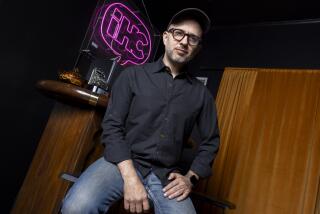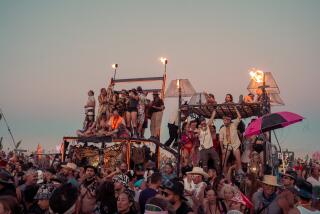What Hard Summer founder Gary Richards said about safety before 3 fans died at this weekend’s concert
- Share via
Two women and one man died at this weekend’s Hard Summer music festival in Fontana. The electronic music and hip-hop event has seen tragedy before; in 2015, two concertgoers died. Ahead of this year’s event, August Brown discussed fan safety with festival founder Gary Richards in the interview below, first published on July 26.
----------------------------
After one of Hard Summer’s toughest years, the festival is returning bigger than ever this weekend. In 2015, the electronic and hip-hop event (now produced by Live Nation) hung on by a wire after two fans died of suspected drug ovedoses at Pomona Fairplex. Following government scrutiny, Hard scaled down its winter edition and organizers had to find a new location.
Now at the Auto Club Speedway in Fontana, Hard Summer’s lineup features headliners Ice Cube and Major Lazer and a bevy of rising rappers and dance music DJs.
We spoke with festival founder Gary Richards about how the fest has recovered and what the future holds (including, for the first time, camping).
This is your first year at the Auto Club Speedway. It’s a massive new site. What does this allow you to do that you couldn’t before?
This site is 500 acres and it’s used to having thousands of people for NASCAR races. There are tons of things in place to handle traffic and ingress and egress. We just have space. It’s definitely going to be largest Hard Summer yet. The Speedway people have been great partners, and it feels better situated. The neighbors are farther away, which is better for what we do.
This is the first year you’ve had camping on-site; how will that change the festival’s dynamic? Does it make for an easier commute and safer experience?
It gets more vehicles off the road and less people leaving late at night. It’s a better way to wind down. We’ll have a silent disco and an area where people can get coffee and ice and showers. I never thought of Hard as a camping fest before, but when they do NASCAR races here, they have two thousand RVs in the infield. I’ll definitely be hanging out in the campground myself.
The lineup feels especially diverse this year, with many hip-hop headliners. How does that reflect the changes in your audience right now?
Hard’s always been diverse, the first one had Justice, Peaches and 2 Live Crew. In music, hip-hop is shining right now, and we’re trying to blend that into the fest. Ice Cube is bringing MC Ren and DJ Yella (from N.W.A), and having gone to high school in L.A., having that as a headliner is like — now I can retire. There’s still tons of electronic music. But it’s good to break that up, it makes it more of a festival and gives Hard its own style. This is the ninth year of fest, we’ve been at six different locations, and that’s a testament to how strong the brand is and that we’re working with the right artists.
After the deaths last year, Hard’s relationship with Fairplex went south. Do you feel like you’ve found a long-term home at the Speedway? And how can you improve relationships with local and county governments?
That’s the game plan. We just want to be in one place and turn it into something spectacular. Our plan — the way we do gates, searches and how our security works with law enforcement, it’s the best in the business. Ask anyone we’ve worked with in the past. When you work with someone new, they can be hesitant, but when they see our team and how it’s organized, it’s amazing. After nine years, we’ve got it down.
Are there any new safety measures in place for this year?
At the end of the day, we do everything we can do. The biggest difference this year is that we’re creating even more awareness. We have a campaign, Awareness Wednesdays, to give tips to stay safe if problems arise. We’re doing a Q&A with the head of our medical plan for the festival from Loma Linda (University Medical Center). We have free water, shade, cooling areas and medical stations.
We also have our Stand Up and Dance crew, who are young adults who walk around with ice packs and water, looking for people who need help and can see if they’re having a situation. We teach people that you can always go to a medical tent and no one will question you, they’ll just help. Sometimes when someone approaches you from the festival and asks if you’re OK, it’s easier to talk peer to peer instead of with a police officer, when you might be scared to say what’s going on.
But it comes down to the patrons. They have to be responsible for own actions. It all starts at the entrance of the festival — we have K-9 units, searches, you can’t bring in backpacks. We’ve got a system in place, but if people want to be stupid, they’re going to be stupid. We have to educate everyone, but there’s only so much you can do as promoter.
Are you ever going to have a team like DanceSafe, which tests illegal drugs on-site?
I don’t think we’re allowed to have it at our event. Everyone knows we should have it, but the law says we’re not allowed to. That’s the last piece of the equation to add to safety. But our biggest thing is to keep (drugs) out before they get there — we have amnesty boxes, undercover agents, a thorough search. If you’re going to try to bring stuff in there, you’re probably not the smartest person on Earth.
See the most-read stories in Entertainment this hour »
After all the challenges of last year, and given this big new venue, how do you see the festival growing and changing over the next few years?
Next year is our 10-year anniversary, and we’d like to expand it to three days. We’ve dabbled in other countries, and done stuff in Australia, Japan and a stage at Creamfields in the UK. Maybe we can go to the East Coast too. But what I’ve learned is that just getting this right is a year-round job. I live in SoCal, and it’s always good to do this in our own backyard. I don’t think many fests are doing what we do. I talk to lot of artists who said that after 10 years, we’ve got to do something emotional together.
ALSO
Hard Summer, at a turning point, is driven by political hip-hop
Sunday night at KCON: BTS, TTS and Eric Nam show K-Pop’s range
More to Read
The biggest entertainment stories
Get our big stories about Hollywood, film, television, music, arts, culture and more right in your inbox as soon as they publish.
You may occasionally receive promotional content from the Los Angeles Times.











